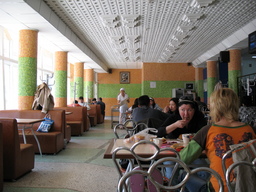
Soviet-era Cafeteria:
Semipalatinsk
 Soviet-era Cafeteria: Semipalatinsk |
I'd forgotten how everybody in this part of the world mistakes me for being Turkish. I've had a couple people today--a museum guide, a shop clerk--ask me after a minute or two of conversation if I wasn't from Turkey.
There are two language choices on the streets of Kazakhstan: Russian or Kazak. My familiarity with Russian is hopeless: I'm not even trying to speak that language. However, Kazak is similar enough to Uighur that I can manage the basics. I speak Uighur, they speak Kazak. I still find it strange that there's a fair bit of mutual comprehension.
I do try to adapt my accent a bit: y- sounds are rendered as zh- in Kazak. The phrase "silk road" is yipek yoli in Uighur. That turns into zhibek zholy in Kazak. Going the other way, I have to drop the Uighur habit of slurring unvoiced consonants after an i- sound. The number 2, eki, is pronounced ishki in Uighur. Similarly, the word "dog" goes from Kazak it to Uighur ishit.
Even if I had all the phonetic changes between the languages down pat, I'd still have to be cognizant of some minor differences in vocabulary and grammar. Hearing my strange-but-close speech, people reasonably assume that I'm Turkish. Turkish, Kazak, and Uighur all fall into the same language family.
Another thing I'd forgotten about in this part of the world: how much cheating there is. The last time I was in Kazakhstan, my final leg out of the country was an overnight train with Rian down to the Uzbek border. On that run, we were taken by paying for use of fresh sheets and pillowcases that should have been free. Fortunately, we did not fall for the member of the railway staff who demanded the equivalent of $33 USD from each of us a couple hours later.
 Chess Players: Panfiloff Park, Almaty |
Tomorrow, I'll take a bus to Ust-Kamenogorsk (a.k.a. Oskemen). That should be the last city I stay in before crossing the border into China. I'm hoping to cross through the border at Gemini, which is probably one of the world's more remote roads with a functional border post. Gemini is in the region of Altay, a mountainous area shared by four countries: Mongolia, Russia, Kazakhstan, and China. Altay is legendary for its beauty: hills, forests, and nomadic people of many ethnicities--among them Kazak, Mongol, and Tuvan.
I'm not sure whether I'll be able to go that route. I've been in touch with somebody through CouchSurfing who lives in Ust-Kamenogorsk. He checked into buses crossing that Gemini border. It sounds like they may leave less frequently and cost more than I'd expected. There should be direct daily buses clear through to Urumqi via another remote border post: Chuchak (a.k.a. Tacheng). Despite that the latter crossing is also seldom-traveled, I really hope to make it through at Gemini. Something about Altay (a.k.a Altai), its natural setting, and its nomads, captures my imagination.